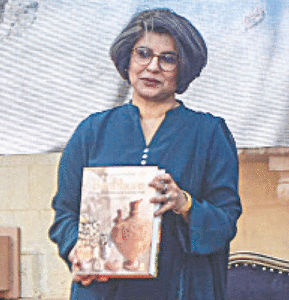KARACHI: It happens very rarely that a play makes a lasting impression on theatre-goers because of its audaciously honest content. Who can even think in our part of the world that a play highlighting the social faultlines that exist in as fearsome an institution as the army could be staged? But Indian playwright Swadesh Deepak’s no-holds-barred drama Court Martial, which was presented for the media at the National Academy of Performing Arts’ in-house theatre on Tuesday evening, poignantly underlines the caste and class system that lurks underneath the disciplined exterior of the Indian army.
Directed by Napa graduate Sunil Shankar, Court Martial’s central character is Ram Chandr (Kashif Husain), a jawan in the army. He has been accused of murdering one of his senior officers, Captain Verma, and injuring another, Captain B.D. Kapoor (Fawad Khan). When the play begins, Ram Chandr is already in court, facing trial. Battle-hardened, no-nonsense Col Surat Singh (Adnan Jaffer) is presiding over the proceedings. The colonel is a tough cookie who has no sympathy for those who violate the discipline of the army.
During the course of the trial the prosecution, Major Ajay Puri (Ali Rizvi), sees no complication in the case as Ram Chandr himself has confessed to the crime. But defence counsel Captain Bikas Roy (Nazrul Hasan) is up to something else. He views things in a different light as he poses ostensibly irrelevant questions to witnesses but they are actually related to the genesis or the back-story of the whole saga.
The witnesses — Sobedar Balwan Singh (Owais Mangalwalla), Captain B.D. Kapoor, Captain Dr Gupta (Meesam Naqvi), Lt Col Rawat (Hammad Sartaj) and Ram Chandr — respond to the queries initially in a roundabout way but as Captain Roy persists with his line of reasoning, they find it hard to suppress the truth. The truth is that Ram Chandr belongs to a low caste and Verma and Kapoor (prior to the shooting incident) often insulted him using derogatory words such as harijan, bhangi and chamaar. Kapoor’s aversion to Ram Chandr was aggravated by the fact that he’s an outstanding sprinter who once beat Kapoor in a race. Kapoor had left no stone unturned in insulting Ram Chandr and made him do menial work.
The court proceedings disarm Col Surat Singh and he feels that the recruit has been hard done by. But he can’t change his decision. Ram Chandr has to be hanged till death. However, Captain Roy’s insightful reasoning affects Col Singh’s heart forever.
Director Sunil Shankar should be congratulated for picking such a psychologically demanding play. He should also be commended for putting up a top-notch show on Tuesday. He must’ve known that court room dramas are not easy to pull off, especially before Pakistani audiences, and yet he took that risk. Good on him that it paid off. There were very few faulty moments in the production in terms of performances. And the subtlety with which he brought to the fore the ethnic divide in the army (officers reminding Roy of his Bengali background) was noteworthy.
Two actors stood out head and shoulders above the rest: Nazrul Hasan as Captain Roy and Meesam Naqvi as Captain Dr Gupta. Nazrul Hasan was absolutely believable in trying to make a tenable case for the hapless jawan Ram Chandr, increasing and bringing down the momentum of the intense situations according to the reactions he wanted to elicit from the witnesses. His tussle with Captain Kapoor was quite absorbing.
Meesam Naqvi didn’t have a big part to play but the way he showed his reluctance to speak the truth as a member of the army’s medical team hints at his instinctive understanding of the art of acting.
Now the downsides. While it is understandable that the witness box was the central prop in the production because it was there that the gist of the story was to be told, its placement smack in the centre of the stage gave the play a strange look. Then Fawad Khan who acted well as Captain Kapoor for some reason spoke in a thick Haryanvi accent whereas the Kapoors speak Punjabi. Having said that, in the larger scheme of things, these minor hiccups don’t matter. The play will run until Oct 20 from Thursday to Sunday.













































Dear visitor, the comments section is undergoing an overhaul and will return soon.